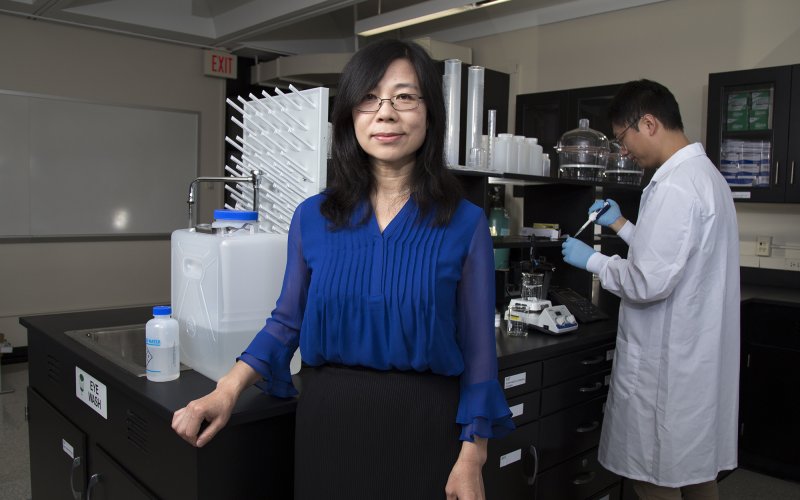Finding Solutions to Remove PFAS from Water

ALBANY, N.Y. (Feb. 2, 2023) — For Professor Yanna Liang, providing sustainable designs for natural and engineered environments, and promoting sustainability in all areas related to the environment and human health is critically important to her work. This is her task in teaching and training students at the College of Engineering and Applied Sciences to become future environmental engineering leaders who can address local and global environmental problems.
“Human beings are used to grabbing natural resources, using them and then discarding the wastes at places that are far away,” said Liang, who chairs the Department of Environmental and Sustainable Engineering. “Considering global warming and limited space for landfills, innovative solutions are urgently needed to tackle the waste disposal issue. My solution is to convert waste to treasure through regenerative engineering.”
Over the summer of 2021, Liang took part in the State of New York’s annual SUNY Startup Summer School, where she joined with 150 faculty, students and staff from 22 SUNY campuses to explore ways to bring new technologies to market.
Liang’s startup, Regenerative Solutions Inc. (Regen), established in September 2021, is now partnering with UAlbany to develop green, environmentally sustainable, low-cost sorbents that remove PFAS (per- and polyfluoroalkyl substances) from water. PFAS are harmful, synthetic forever chemicals that can cause cancer, liver damage, decrease fertility and increase the risk of asthma and thyroid disease.
Liang’s hope is that once developed, the newly synthesized sorbents can be tested and certified by the National Sanitation Foundation, and her products can go to market for treating water at both small and large scales.
For her efforts, FuzeHub, the statewide New York Manufacturing Extension Partnership center, has awarded Regen $50,000 from the Jeff Lawrence Innovation Fund to support cutting-edge developments in materials science, while raising the bar for eco-friendly manufacturing.
FuzeHub and NYSTAR, Empire State Development’s Division of Science, Technology and Innovation, received a number of applications for the funding initiative, launched in September. They challenged New York’s innovators to consider the environmental impacts of their potential high-performance products, and submit projects that would lead to greater sustainability in the manufacturing industry.
“The mission of Regen is to help sustain society and environment through a regenerative approach,” said Liang. “This approach is rooted in our deep understanding of interactions between human beings and the ecosystem. To ensure that our future generations can still enjoy this beautiful planet, we must replace the linear economy that has been practiced for many decades with a circular one and expand our creativity toward identifying, developing, and implementing sustainable and regenerative solutions.”
At the current stage, Regen provides two types of solutions. First, converting organic wastes to high-value products and fuels. Second, innovative approaches for remediating PAFS.
Food waste, sewage sludge, and animal manure all contain high content of carbon. If discarded at landfills, the organic carbon will be converted to greenhouse gases. If digested anaerobically, biogas will be produced from these wastes. Although biogas can be used for combined heat and power, this gas itself is of low value. If composted, the organic wastes can be turned into fertilizers, but the composting process releases a huge amount of CO2 as well.
“To produce higher value products from the organic wastes, we aim to cut the digestion process short,” said Liang. “By adopting unique pretreatment processes and preventing methane generation, we have observed high titers of volatile fatty acids (VFAs). These VFAs can be sold as renewable and green biochemicals and used for producing sustainable aviation fuels.”
To remove PFAS from the environment, Regen has been working on using plant uptake followed by a thermal process to destroy PFAS accumulated in harvested plant biomass. This approach can be employed at PFAS‑contaminated soil, sediment, and shallow groundwater.
“Through our years of research on this topic, we know how to engineer the process and make PFAS removal faster,” said Liang. “We have also made great progress in designing and synthesizing green sorbents.”
In terms of PFAS, a sorbent is generally a solid material that can grab or adsorb PFAS in water. A typical example is granular activated carbon (GAC). GAC has been used in household and industries for removing undesired metals, chemicals, etc. from water.
Out of more than 30 sorbents synthesized and characterized so far, one clay‑based sorbent is found to outperform all commercially available sorbents in the market for PFAS removal. This material can be used to remove PFAS from drinking water, surface water, stormwater, and groundwater. It can also be used to stabilize PFAS in soil, sediment and sewage sludge.
“Manufacturing in New York is cleaner and greener than ever before — but we can still do better as an industry,” said Elena Garuc, executive director of FuzeHub when the funding was announced. “Through the use of advanced materials, we believe manufacturers can make products, leverage technologies, and use processes that strengthen sustainability. These winning projects are going to show us what’s possible.”
The Jeff Lawrence Innovation Fund — which serves as the source of funding for this Innovation Challenge — supports a set of activities designed to spur technology development and commercialization across New York State. Launched in December 2016, the fund is named for Jeff Lawrence, a champion of the New York manufacturing and entrepreneurial communities. Each year, the Innovation Fund provides more than $1 million in direct assistance to the manufacturing, research and development, technology and entrepreneurial ecosystems. To date, the fund has awarded $7.3 million in funding to support collaborative projects throughout the state.
FuzeHub is a nonprofit organization that connects New York’s small and mid-sized manufacturing companies to the resources, programs and expertise they need for technology commercialization, innovation and business growth. Through its custom assessment, matching, and referral platform, FuzeHub helps companies navigate New York’s robust network of industry experts at Manufacturing Extension Partnership (MEP) centers, universities, economic development organizations, and other providers. FuzeHub is the statewide New York MEP Center, supported by NYSTAR (Empire State Development’s Division of Science, Technology & Innovation).




